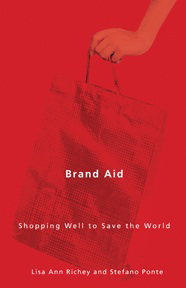Are celebrities good for development aid?
by Lisa Ann Richey and Stefano Ponte Recent New York Times coverage of Madonna’s “Raising Malawi” school project has once again drawn attention to the role celebrities play in raising awareness and funds for international aid. But at the same time, the report—which chronicled the collapse of Madonna’s poorly-managed venture—brings negative exposure to “good causes” for Africa.
There was a similar case in January, when an Associated Press story on corruption in The Global Fund to Fight AIDS, Tuberculosis and Malaria was picked up by 250 media outlets worldwide with headlines such as “Fraud plagues global health fund backed by Bono.” Would the media spread with such great interest a story of lavish spending in any run-of-the-mill private school in Malawi or of corruption in the United Nations? Probably not.
 The Global Fund is now known as “celebrity backed,” and almost no news story of the recent corruption saga has been without reference to Irish rock star Bono and celebrity philanthropist Bill Gates. Celebrities draw attention and stir emotion. But now, the opportunity to link development aid mismanagement or lavish spending with global celebrities has led to negative publicity. People all over the world are interested in what is happening to “Bono's Fund” or “Madonna’s Malawi.” Yet, as is often the case with celebrity-driven media, the stories actually provide little information on what is going on in The Global Fund or in the countries where it works, or in the education sector in Malawi.
The Global Fund is now known as “celebrity backed,” and almost no news story of the recent corruption saga has been without reference to Irish rock star Bono and celebrity philanthropist Bill Gates. Celebrities draw attention and stir emotion. But now, the opportunity to link development aid mismanagement or lavish spending with global celebrities has led to negative publicity. People all over the world are interested in what is happening to “Bono's Fund” or “Madonna’s Malawi.” Yet, as is often the case with celebrity-driven media, the stories actually provide little information on what is going on in The Global Fund or in the countries where it works, or in the education sector in Malawi.
We explore this phenomenon in Brand Aid: Shopping Well to Save the World (just released by the University of Minnesota Press). In the book, we examine what happens when aid celebrities unite with branded products and a cause. The resulting combination—what we call “Brand Aid”—is aid to brands because it helps sell products and builds the ethical profile of a brand. It is also a re-branding of aid as efficient and innovative, based on “commerce, not philanthropy.”
In the case study of Product (RED), a co-branding initiative launched in 2006 by Bono, we show how celebrities are trusted to guarantee that products are “good.” Iconic brands such as Apple, Emporio Armani, Starbucks and Hallmark donate a proportion of profits from the sale of RED products to The Global Fund to finance HIV/AIDS treatment in Africa. In essence, aid celebrities are asking consumers to “do good” by buying iconic brands to help “distant others” —Africans affected by AIDS. This is very different from “helping Africa” by buying products actually made by Africans, in Africa, or by choosing products that claim to have been made under better social, labour and environmental conditions of production.
In Product (RED), celebrities are moving attention away from “conscious consumption” (based on product information) and towards “compassionate consumption” (based on emotional appeal). To us, this is even more problematic than the risk of negative media attention that celebrities bring to development aid.
--
Lisa Ann Richey is professor of development studies at Roskilde University. Stefano Ponte is senior researcher at the Danish Institute for International Studies. To read more, see their book Brand Aid: Shopping Well to Save the World (University of Minnesota Press, 2011). Join the conversation on Facebook or on Twitter: @BrandAid_World
 From Aid to Equality
From Aid to Equality
